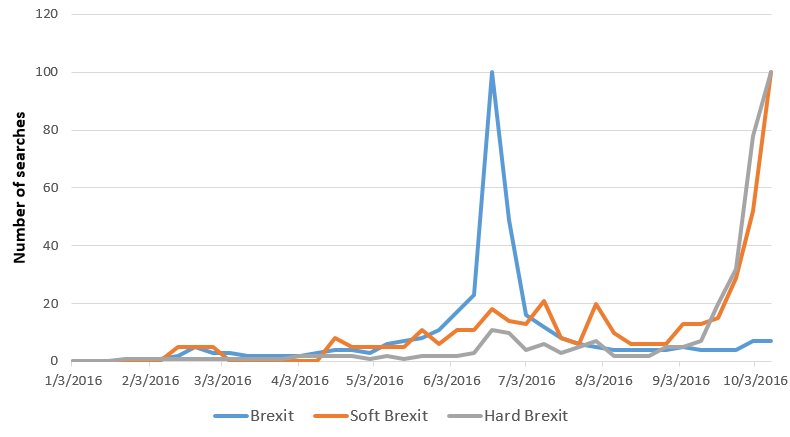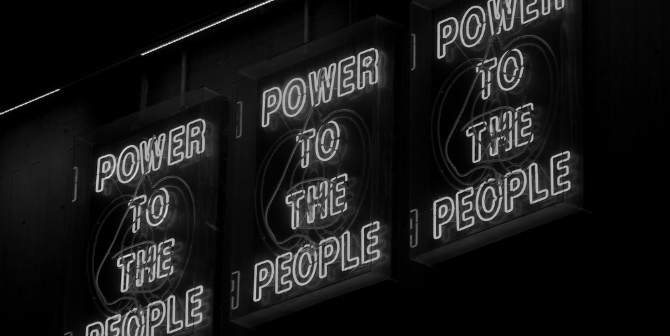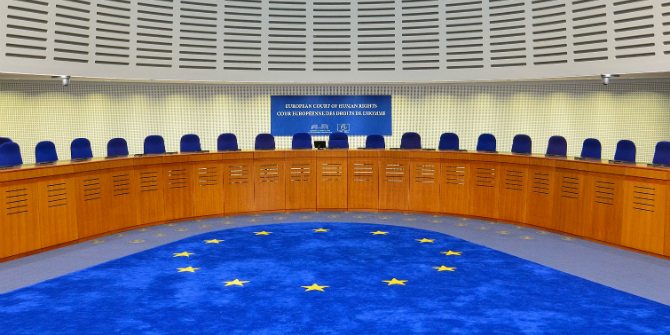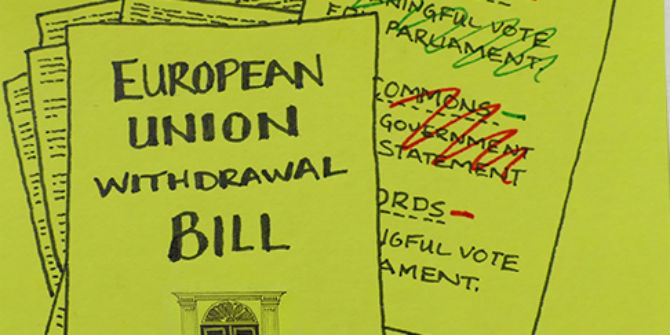 Theresa May has rejected calls for the UK parliament to have a vote on the terms of Brexit, however, on 12 October she accepted that there will be an opportunity for parliament to debate the country’s strategy before Article 50 is triggered. Valentino Larcinese states that the argument against parliament having a strong role in the process rests on a decidedly misguided notion of the ‘will of the people’ and that UK citizens deserve adequate deliberation and decision-making procedures to determine the way forward following the referendum result.
Theresa May has rejected calls for the UK parliament to have a vote on the terms of Brexit, however, on 12 October she accepted that there will be an opportunity for parliament to debate the country’s strategy before Article 50 is triggered. Valentino Larcinese states that the argument against parliament having a strong role in the process rests on a decidedly misguided notion of the ‘will of the people’ and that UK citizens deserve adequate deliberation and decision-making procedures to determine the way forward following the referendum result.
According to Britain’s Prime Minister, Theresa May, giving the UK’s Parliament a vote on Brexit plans will “thwart the will of the British people”. As political science and political economy students usually learn during week 1 or 2 of their courses, this statement makes no sense. A well-established literature in social choice theory, of which Kenneth Arrow’s impossibility theorem is probably the most important result, shows that unfortunately the “will of the people”, British or otherwise, does not exist.
Brexit and the ‘will of the people’
It is difficult enough even to define and understand the desires of single individuals, as shown very clearly by recent advances in behavioural economics. But let’s ignore this complication and let’s assume that everybody in a polity (say the UK) has well-defined preferences, is well informed and it is a fully rational person. Let’s even concede that these preferences remain stable over time.
These assumptions, unrealistic as they are, are nevertheless insufficient to result in collective rational preferences. In other terms, it is impossible to aggregate individual preferences into a rational “will of the people” if we want to give a fair representation to all views and opinions in society (i.e. no dictatorships) and we also think that people should be entitled to have any views they want. The debate on Brexit (or any other matter) would then be a better debate if it could avoid metaphysical representations that portray multiple individuals as a single entity.
William Riker, one of the most prominent 20th century political scientists and one of the founders of the rational choice approach to politics, famously used Arrow’s results to distinguish between a populist and a liberal view of democracy. In the populist view, democracy tries to aggregate the desires of individual members of a society into a collective will (like Theresa May would claim has happened with the Brexit referendum). In the liberal view, the purpose of democracy is rather to keep elected representatives held to account.
These representatives do not deliver the public will (which does not exist), but must respond to the public for their choices according to some pre-defined procedures. We do not necessarily have to agree with Ricker, but still, the problem remains of how to take collective decisions and how to interpret these decisions once they are taken. After all, democratic regimes also allow referendums, whereby decisions on some matters are directly taken by the voters: referendums might not deliver the people’s will but, once we agree that this is a good procedure, then the outcome should be respected.
May’s theorem
There is one insight in social choice theory which could support Theresa May’s approach to Brexit. This is called May’s theorem and is named not after the current Prime Minister, but rather after the American mathematician Kenneth May who proved the theorem in 1952. It is also useful to clarify that the other famous theorem “I am the Prime Minister, therefore, I am right” has nothing to do with it.
The theorem suggests that, in binary choices (i.e. when we have only two alternatives), majority voting is the best system and the only one which satisfies a number of desirable properties. On 23 June the choice was binary (Leave or Remain) and therefore the outcome of that referendum, which has been reached using the best possible rule, gets us as close as possible to the metaphysical idea of the “will of the people”.
But while May’s theorem could be used as the foundation for Theresa May’s “will of the people”, we have now learned that there are at least two versions of Brexit, hard and soft, which only came to the forefront of public debate after the referendum, as shown by the graph below reporting the weekly frequencies of Google searches on “Brexit”, “Soft Brexit” and “Hard Brexit” in the UK. The blue (“Brexit”) spike refers to the referendum week. It is only in September that a clear awareness seems to have emerged of the existence of at least two possible Brexit options.
Figure: Weekly number of searches for “Brexit”, “Soft Brexit” and “Hard Brexit” on Google

Source: Google Trends
Had the Remain camp won the contest we would have probably learned that there was more than one Remain option too. So what has happened is that a complex multidimensional choice has been reduced by the referendum to only two options: the consequence is that a choice has been made but it’s not clear which one. Note that if this was not the case, any discussion of hard or soft Brexit would be superfluous: the referendum outcome would provide by itself an indication of what should be done now. Goodbye May, we are back in Arrow’s world!
The importance of institutions
One of the key insights in Arrow’s theorem is that institutions matter: when three options or more are available, different procedures can induce the same society (with exactly the same individuals) to take different decisions on the same matter. We might, for example, end up with a different government depending on whether we use a first past the post or a proportional electoral system. We need to acknowledge this unpleasant characteristic of collective decision-making: there is nothing divine about these rules and about the decisions which are taken using them. The best we can hope for is that everybody (or at least a qualified majority of citizens) agrees on the rules themselves irrespective of the outcome that they deliver.
This is the reason why most constitutions provide a bias in favour of the status quo when it comes to issues of extreme importance, like amending the constitution itself. While ordinary policy is normally taken by simple majority rule, constitutional changes require more complex procedures. These procedures typically create a status quo bias both to protect minorities against a “tyranny of the majority” and to make it more likely that the changes have been carefully evaluated, possibly by different independent players. Broad coalitions must then be formed to pass a constitutional change.
Amendments to the US constitution, for example, must be voted by two-thirds of both the House and the Senate and must then be approved by three-quarters of the 50 state legislatures. In Italy, there will soon be a referendum on a major constitutional reform. This reform has already been passed twice by the parliament (with a “reflection pause” of at least three months between each vote).
In comparison, it is quite extraordinary to observe the levity of the Brexit decision-making process, ever since Cameron committed to a referendum. Brexit is no less important that a major constitutional change (except maybe that it is more costly) and yet, following a consultative referendum, it now seems to be taken as an accomplished, inevitable outcome, which only needs to be implemented (if only we knew how). Brexit is “the will of the British people”, the contemporary correspondent of the divine will in the ancient regime.
Such misunderstandings as to the interpretation of the outcome of the referendum can emerge for many reasons, including short-term political opportunism, but there are at least two other reasons worth discussing. The first is the somewhat naïve view that democracy is the simple implementation of majority rule and that the referendum has enabled us to discover the “will of the British people”. Unfortunately, the absence of written constitutional rules has allowed this simplistic view to become prevalent.
The second reason stems from the gravy train which Brexit is creating in Whitehall. There are few things which are more desirable for politicians than being able to expand their influence by distributing jobs and perks. So far two new departments have already been created specifically to deal with Brexit and they have hired (or poached from other departments) hundreds of civil servants. It is now anticipated that the Brexit ministry will need to double its size and one wonders how many times it will have doubled before Brexit is accomplished.
Outside of these departments, it is hard to think of any area of public administration that will remain unaffected by Brexit. The civil service will have to expand, hiring thousands of new employees who will spend their days reviewing EU laws and the ways they currently affect the British legal and regulatory system, preparing material for negotiations with the EU and for the individual new trade deals that will have to be struck with dozens of countries, delving into the intricacies of fisheries, agriculture, financial services and virtually every other sector of the British economy.
Armies of external consultants will be hired and paid thousands of pounds per unitary day of work. Nobody knows the impact of this process on the UK budget but, over the many years that the process will take, it could easily add up to billions of pounds. In brief, for politicians, Brexit is a rare opportunity to expand and shape public administration. If a populist view of democracy seems to reflect the current prevalent mood in the British public, the gravy train might have its appeal for decision-makers.
It should be clear at this point that allowing parliament to vote on Brexit plans will not thwart the will of the British people. Yes, a referendum has taken place and, whatever its interpretation, there is no doubt that its outcome must be respected. At the same time, however, taxpayers’ money, people’s jobs and more generally the prosperity of this country also deserve respect.
This does not mean that the outcome of the referendum should be ignored – I would never claim this – but simply that the people of this country deserve adequate deliberation and decision-making procedures to determine what has to be done now. It would be paradoxical if the parliament was not part of this process since one of the most important arguments in favour of Brexit concerned precisely the sovereignty of Westminster against the technocracy of Brussels. Even more paradoxical is the fact that the government intends to interpret the outcome of the referendum as a mandate to do pretty much what they like.
This article first appeared on EUROPP and it gives the views of the author, and not the position of the Brexit blog, nor of the London School of Economics. Image credit:(CC BY 2.0)
Valentino Larcinese is Professor of Public Policy in the Department of Government at the London School of Economics.








What nonsense. It is accepted that following a national election, the people have spoken. There is no requirement for the existing Parliament to debate what the people have voted for and contemplate running the whole General Election all over again to see if anyone has changed their minds on who / what they voted for.
The people were informed on what they were voting for, in fact the question could not have been more straight forward, do you want to remain in the EU or do you want to leave the EU and the majority of us voted to leave. Our Government (led by Theresa May) is now responsible for delivering what we voted for. It is their responsibility to put their own personal feelings aside in doing so. To allow the assorted disgruntled collection of individuals whose stated intentions are to ignore the will of the electorate and ensure the country remains in the EU to do just that, would be a dereliction of duty, allow them to turn our democracy into a travesty and unleash the mayhem which would surely follow.
“It is accepted that following a national election, the people have spoken.”
Because general elections are not irreversible decisions. They last 4 or 5 years, possibly less. Brexit is forever.
“The people were informed on what they were voting for”
They were misinformed. The “debate” was like a point scoring exercise, not a serious debate around a life changing issue. It was pathetic. People were lied to, and lapped it up, by a campaign group with no mandate or political power.
“and the majority of us voted to leave.”
The majority of those permitted to vote. What of those who should have had a say, but were disenfranchised? Doesn’t suit your narrative of the Will of the People, does it.
This author of this article is basically saying in a long winded way “I don’t like the result of the referendum, let’s ignore it but pretend that we are not ignoring it”
This is just complete nonsense, based on the idea that people were somehow unclear what they had voted for. There is no such thing as a “soft Brexit” – and certainly in the sense that people seek to apply that term, it isn’t actually Brexit at all! The single market, for example, was explicitly ruled out in the campaign in the event of Brexit, not only by Cameron and Osborne (there is TV evidence of this) but also by Michael Gove on the Leave side. Nobody expects Brexit to be accompanied by remaining in the single market, because control over UK’s border with the EU was a clear campaign commitment from all parties campaigning to leave.
There is only one purpose for this sort of article – and that is an attempt at subversion of our democratic decision. It should therefore be immediately binned as it is dangerous garbage.
The previous comment by Mike is typical of the Brexiteers’ arguments. “We won, you lost, so you can get stuffed”. This may be OK for a saloon-type brawl in Nigel Farage’s local Kent pub. but it is an argument riddled with inconsistencies.
To take the referendum. The vote to Leave was by 52% to 48 %; it couldn’t have been much closer. There was a barrage of propaganda from the Right-wing press (led by the Sun, Daily Telegraph, Daily Express and Daily Mail). I could go on, but you get the picture.
To take the general election. The Conservative government was elected on a mandate to hold a referendum on EU membership. It was not elected to undertake a hasty, unaccountable Brexit. It most certainly was not elected to undertake a “hard Brexit”, rupturing relations within the United Kingdom, and with the 27 remaining members of the European Union.
Of course the outcome of the vote could have been closer, not that that would have made the slightest difference, the people who voted to leave had the highest number of votes and that result should be respected. If we are going to venture into the realm of speculation, then had the vote been conducted on a General Election format, then the Leave vote would have been won on a 60% to 40% basis.
Yes there was a barrage of propaganda, we were bombarded by warnings of economic catastrophe, we were threatened by heads of other countries that if we didn’t vote to remain we would be punished and £11million of taxpayers money was spent by the remain camp on producing a glossy telling us why we should vote to remain (basically what the consequences would be if we left) and still those who want to leave the EU won the vote.
Yes, the Government is now required to implement the outcome and if the EU will not respect our wishes and agree to trade on a mutually beneficial basis without all the federalist baggage, then we walk away
I am tired out arguing with Karl! He is quite entitled to his views; it is just the extreme way he phrases his arguments that gets to me.
I do not see where the notion that “if the referendum had been run under General Election rules” the result would have been 60% to 40% comes from. This seems to me complete baloney; there is no comparison between the two.
Then we will stop exchanging comments with each other. I wouldn’t be offended, there is no gratification in exchanging comments with someone who holds opposing views if they are only deriving unhappiness from doing so.
This article is dishonest. First, leaving the EU via (for example) Art. 50 notification and getting a deal for a ‘soft/hard Brexit’ are legally entirely separate. The latter only happens two years after the former, and depends on whatever the EU states agree to. The two are different – and so splitting the result to soft/hard/etc. is completely unjustified.
Second, the use of Google Trends appears to be mistaken. The graph from 0 to 100 is usually what it shows when the data is normalized (via its ‘indexed search interested’). I wouldn’t be surprised if the real number of searches was much lower, too low to say anything about public interest. The author wouldn’t be the first to badly use Trends when writing about Brexit:
https://medium.com/@dannypage/stop-using-google-trends-a5014dd32588#.dfajwm388
https://medium.com/@remysmith/very-interesting-article-ill-admit-to-having-succumbed-to-that-against-which-you-re-railing-f82fb88d6a23#.dd62786ls
Third, if we must discuss Arrow’s theorem, one must note there’s been a lot of criticism both of its premises and its application. One example: The IIA critirea used thereof is dubious (even theoretically) and quite a few cases of existing politics directly violate it. Once IIA is weakened to a more sane level, voting systems that satisfy all the relevant criteria do exist.